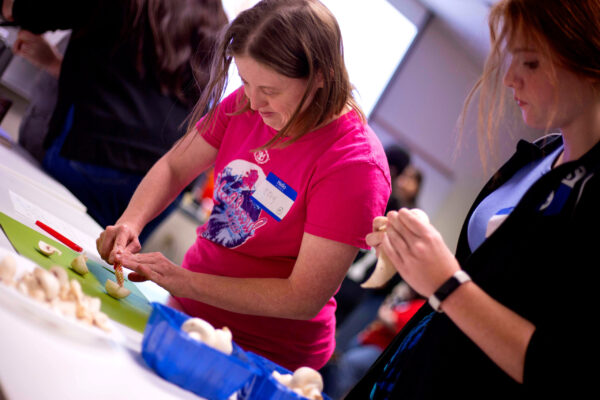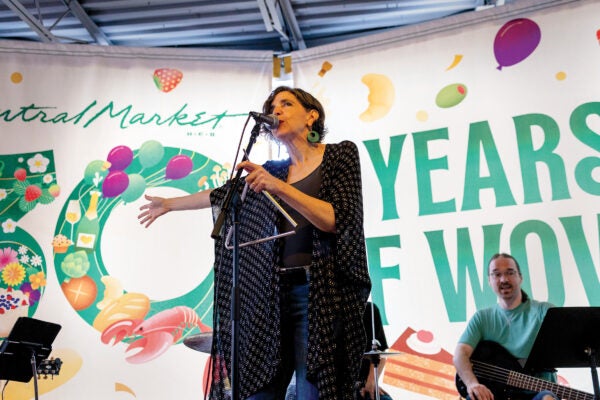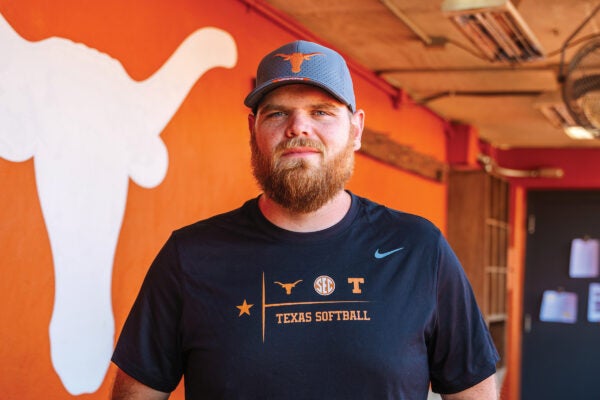Coconut milk, brown sugar, lime juice, chicken broth and onions wait on the tables in a room in the Neural and Molecular Science Building. About a dozen students sit crisscross on the floor as Kaelin Rubenzer stands in front of the projection screen and points to the recipe for the day, Thai red curry.
The Lifelong Learning with Friends students are divided into three groups. One student cuts orange, yellow and red bell peppers into slices. In a room across the hall, students wear gloves as they shred a rotisserie chicken. Together, they work to assemble their dinner for the night.
Lifelong Learning with Friends is a University of Texas program for adults with intellectual disabilities, such as autism, Down syndrome or other chromosomal disorders. The program hosts about eight to 15 classes per semester, both in person and via the internet. It accepts 13 students per class on a first-come, first-served basis, serving about 250 adults with disabilities per year, Rubenzer says.
The classes vary from STEM courses to humanities and self-development. During the Fall 2023 cooking class, Rubenzer taught students about different cuisines worldwide.
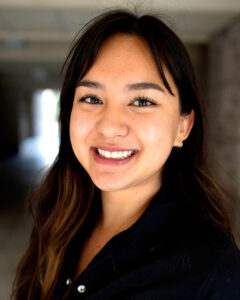
“The big mission of us is to create a more inclusive society,” says Rubenzer, the executive director of Lifelong Learning with Friends. “It’s real, practical experience to meet people with disabilities firsthand and see what they’re capable of.”
Jonathan Pierce, associate professor in the Department of Neuroscience at UT, founded Lifelong Learning with Friends in 2010. The program was inspired by his son, Ocean, who was born with Down syndrome. Pierce wanted to contribute to scientific discoveries and help people with Down syndrome and other intellectual and developmental disabilities get a taste of university life.
“Support services for people with disabilities often end with high school,” Pierce says. “I was wondering whether or not we could keep learning going on in adulthood.”
The program began with Pierce running all the operations, from reserving classrooms on campus to teaching the classes, recruiting students and advertising. As the program has grown, volunteers and instructors have joined the team.
Rubenzer, who has a younger sibling with a disability, volunteered with a life skills program for young people with disabilities when she was in high school. That experience made her see how such students can face limited opportunities compared with their peers.
“A lot of them were doing menial tasks,” she says, such as wiping down tables after lunch or folding clothing. “It seemed crazy to me that this was the end of their educational experience.”
Rubenzer wanted to combine her interest in science and her desire to help people with disabilities after arriving at UT in 2016.
As an undergraduate, she began conducting research in Pierce’s lab, became a Lifelong Learning volunteer, instructed classes and later became the program coordinator. Rubenzer’s involvement with the program solidified her aspirations.
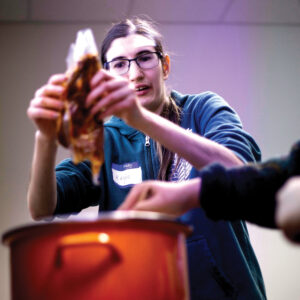
Today, she serves as executive director of the program, leading all day-to-day operations and helping coordinate the curriculum. Rubenzer also participates in volunteer recruitment and instructor training and works closely with Pierce.
In each semester, 100 volunteers join the team, mostly undergraduates from the College of Natural Sciences, the Steve Hicks School of Social Work, the Department of Special Education, and the Department of Speech, Language, and Hearing Sciences. During the Fall 2023 semester, Lifelong Learning partnered with an Austin public school, the Ann Richards School for Young Women Leaders, and over 40 high school volunteers joined the team.
Volunteers assist students during the lessons while instructors lead the class. Instructors include teachers from the Austin school district, family members of people with intellectual disabilities and UT students who have previously volunteered.
During the first half-hour of a class, students take the time to socialize and get to know one another. Students then go into a classroom for the lesson of the day. Classes have fewer text-based lectures and more visually appealing slides. Rubenzer says it is important to be accommodating and have versatile ways to teach the same thing so students can understand the material.
“You need to have concrete activities for them to engage with their senses,” Pierce says.
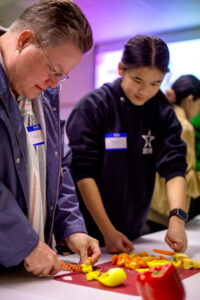
The program also teaches adults with intellectual disabilities about subjects for which they have firsthand experience. For example, Pierce has taught a class about pharmaceutical drug discoveries for UT students. When talking about such topics in Lifelong Learning classes, students may not have a complete understanding of the science of prescription drugs but might have taken them and can share their experiences with one another.
“Adults with Down syndrome and autism, they’re interested in the topics I teach my UT students, including alcohol, drugs, diseases and the newest scientific discoveries,” Pierce says.
Pierce says to break down the stereotypes many people have, it’s important to spend time with people with disabilities, get to know them and realize the similarities we share.
“We’re hoping that when you raise your expectations of people with intellectual disabilities, or you meet someone and really connect with them and hear about their troubles that they have acclimating or being included in society, that you’re able to take that experience and do something with it,” Rubenzer says.
Pierce says it is important to treat people with intellectual disabilities as capable adults, and the Lifelong Learning with Friends program models how college students are treated and should behave in a classroom. A survey conducted by the program found that participants improved their social skills and ability to make friends and connections. Students are then able to take their experience home, and they can take it to the workplace to better succeed in life.
Rubenzer says she wants to strengthen ties within the UT community and hopes to expand the program alongside Pierce. She has recruited more adults with intellectual disabilities by visiting community living programs and providing them with virtual programming. Rubenzer partnered with the Marbridge Foundation, and 40 additional adults enrolled in Lifelong Learning. She plans to continue outreach initiatives across Texas.
“It enriches their overall quality of life, and you can see it,” Rubenzer says. “They’re happier and they’re more confident. They pursue age-appropriate, adult topics because there’s finally an environment that encourages them to.”
